| Srl | Item |
| 1 |
ID:
102392
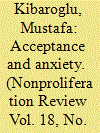

|
|
|
|
|
| Publication |
2011.
|
| Summary/Abstract |
US nuclear weapons have been an important part of Turkey's security strategy since their first deployment on Turkish soil in the early 1960s. Turkey's NATO membership and its close relationship with the United States have been perceived to be integral to maintaining its security. The release of the 2010 US Nuclear Posture Review (NPR), with its focus on disarmament and reduced reliance on nuclear weapons, has a number of potential consequences for Turkey. This article provides background on the history of Turkish-US nuclear weapons policy in light of issues ranging from Middle Eastern politics to the development of NATO's new Strategic Concept. It then describes how actors in the government, military, and academia in Turkey have reacted to the NPR, why they reacted as they did, and how the Obama administration's initiatives may be received in Turkey in the future. This article concludes that both military and civilian actors in Turkey have reacted favorably to the NPR and are pleased by its emphasis on nuclear nonproliferation and the maintenance of extended deterrence; however, there is less agreement in Turkey about the emphasis placed by the NPR on the danger of nuclear terrorism.
|
|
|
|
|
|
|
|
|
|
|
|
|
|
|
|
| 2 |
ID:
061703
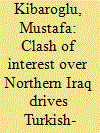

|
|
|
|
|
| Publication |
Spring 2005.
|
| Summary/Abstract |
Turkey and Israel enjoyed an almost perfect relationship throughout the 1990s that amazed their friends, yet bothered their rivals. The US war in Iraq revealed, however, that the two longstanding allies did indeed have contradictory objectives and concerns with respect to the future restructuring of Iraq. While Turkey fears the emergence of an independent Kurdish state in northern Iraq, the same possibility seems favorable for Israel from its security standpoint, vis-à-vis threats posed by countries like Iran, Pakistan, and beyond. It appears that the “amazing alliance” is heading toward a crossroads. Such an eventuality may change the nature of the relationship from a “win-win” to a “lose-lose” situation unless proper steps are rapidly taken with a view toward rebuilding confidence on both sides.
|
|
|
|
|
|
|
|
|
|
|
|
|
|
|
|
| 3 |
ID:
069216
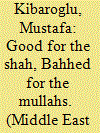

|
|
|
| 4 |
ID:
085544
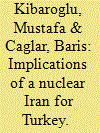

|
|
|
| 5 |
ID:
093660
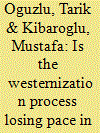

|
|
|
|
|
| Publication |
2009.
|
| Summary/Abstract |
The logic of interest, which has gained considerable ground in foreign policy formulation in Turkey, is not rooted in Western identity, nor is it contingent upon the degree of interaction exclusively with the Western world. The entire world has equal prominence in Turkey's foreign policy orientation. Whether the prevalence of the logic of interest in the formulation of Turkish foreign policy under the "post-Islamist" AKP government signifies a deviation from the Westernization process or whether it is simply a reaction to the conjunctural developments in the international arena in order to preserve Turkey's national interests is seriously debated. This paper aims to contribute to this debate by shedding light on the background of developments both inside and outside Turkey.
|
|
|
|
|
|
|
|
|
|
|
|
|
|
|
|
| 6 |
ID:
074408
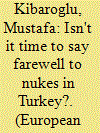

|
|
|
|
|
| Publication |
2005.
|
| Summary/Abstract |
The attitude of Turkish officials toward the US nuclear weapons deployed in Turkey for over four decades has been static. Officials have understandable arguments, based on their threat analysis, as to why these weapons should be retained in Turkey. However, since the 9/11 terrorist attacks, the international security environment has undergone radical changes. The classical deterrent value of nuclear weapons no longer applies with these emerging threats. At the same time, there is an increased probability of unauthorized use of crude radiological devices or nuclear weapons by terrorist organizations. In addition to increased security at storage sites, bolder steps must be taken by concerned countries to get rid of nuclear weapons. Such steps should begin with drawing-down US nuclear weapons deployed in allied countries including Turkey.
|
|
|
|
|
|
|
|
|
|
|
|
|
|
|
|
| 7 |
ID:
096856
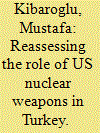

|
|
|
| 8 |
ID:
129720
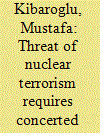

|
|
|
|
|
| Publication |
2014.
|
| Summary/Abstract |
The threat of nuclear terrorism should not be underestimated because it can have catastrophic effects if and when realised. Nor should the subject matter be politicised beyond a certain point because of its strong espousal by the United States, which has raised suspicions about whether the issue could be used as yet another instrument for asserting American hegemony. Institutionalisation of multilateral actions must therefore be supported and nuclear summit meetings must become the forums for addressing the doubts and concerns relating to the international initiatives.
|
|
|
|
|
|
|
|
|
|
|
|
|
|
|
|